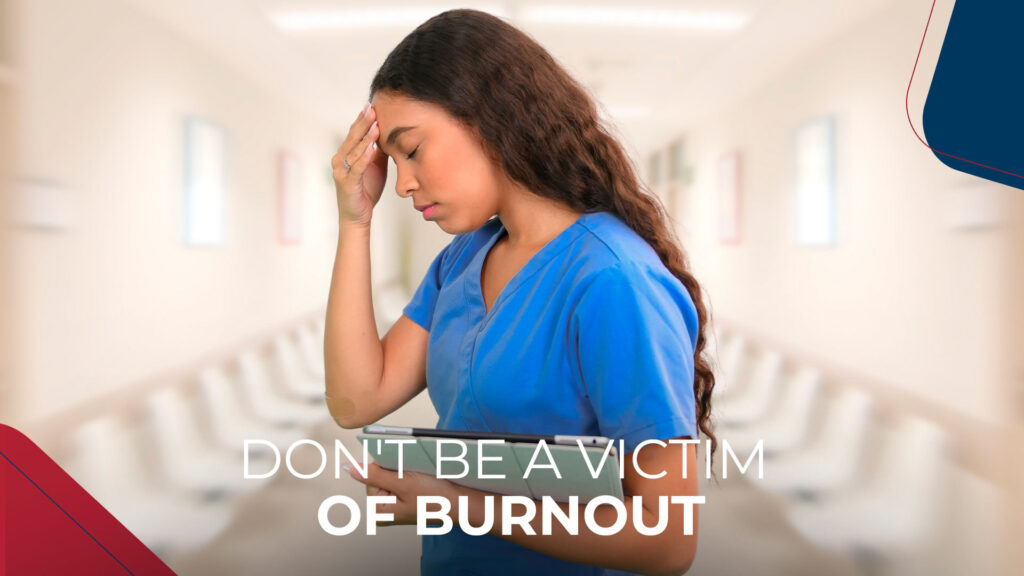Don’t be a victim of BURNOUT!

Burnout syndrome in health professionals.
Discussions about the mental health of workers have been increasingly frequent in work environments, especially after the pandemic and its impacts. Burnout Syndrome in health professionals is an extremely worrying topic. Considering that it is a disease that manifests itself through the mental exhaustion generated by several reasons; stressful routines, excessive activities to be carried out, etc.
Due to its symptoms and consequences, for example, anxiety, panic attacks, depression and many more. In result, it directly influences the health, and well-being and/or the quality of life of team members. It is essential to understand how this disease manifests itself; it’s causes, and most importantly how to avoid it.
What is Burnout Syndrome?
Also known as Professional Burnout Syndrome, this is a psychic disorder that is characterized by a state of stress, and emotional tension. It’s originally caused by physical exhaustion, psychological, and emotional working conditions.
The Burnout Syndrome develops by itself. Health and safety professions are more likely to undergo constant pressure during work. People that have professional goals that are difficult to achieve, and have difficulty accomplishing the functions delegated by their bosses.
In this case, the individual will feel so overwhelmed, as well as incapable all at the same time. It is clear they want to do what is proposed to them, however, they do not have the means nor the energy to do so.
How does Burnout Syndrome affect health professionals?
When we talk about Burnout Syndrome, it is vital to understand that it’s occurrence in health professionals can happen for several reasons. However, many professionals were greatly affected by Burnout during the Coronavirus pandemic, especially those who work on the front line.
In addition, it is possible to identify in this context a long workday, fear, stress, among other negative reactions in the daily lives of these people. It is clear that some of the most affected people are doctors, nurses, and nursing technicians.
A further aspect that should be considered is the hectic routine of health institutions. Which leads to poor sleep quality, increased responsibility, reduced social interaction, lack of emotional support, excessive demands, and other factors that contribute to the drop in mental health of health professionals.
What are the main symptoms of Burnout Syndrome?
To identify Burnout Syndrome it is very important to know what the main symptoms are. Which can include:
• Stomach ache;
• Dizziness;
• Excessive physical and mental fatigue;
• Stress;
• Unwillingness to get out of bed or leave the house;
• Frequent headaches;
• Insomnia;
• Constant negativity;
• Changes in appetite;
• Concentration difficulties;
• Feeling of incompetence;
• Feeling of insecurity and failure;
• Fatigue;
• Sudden mood swings;
• Sense of defeat;
• Lack of hope;
• Isolation;
• Hypertension, among others.
In most cases, these symptoms begin to appear over time, and increasingly worsen. For this reason, many people who suffer from these signs believe it will pass with time, but unfortunately it is much more serious issue.
How to avoid Burnout in a workplace.
Now that it is clear what Burnout Syndrome is, it is crucial to understand what precautions can be applied in everyday life to avoid it. Disease prevention needs to be taken very seriously. Therefore, check out some good habits that can be used in your routine and prevent this problem from affecting your health:
• Seek to include physical activities in everyday life (as a way to maintain physical and mental balance);
• Take breaks from your work routine, (keep in mind that is it necessary to set aside time for leisure and rest);
• Listen to the advice of your family and colleagues (people suffering from Burnout Syndrome do not realize they’re going beyond their limit);
• Avoid the consumption of drugs, alcohol, and stimulants to alleviate the symptoms of the disease and to withstand the pressures coming from work;
• Establish professional life goals and objectives for work and personal life;
• Evaluate working conditions ( try to identify how they affect your physical and mental health);
• Do leisure activities that are different from your routine ( for example, spending time with family, traveling, going to the movies, watching your favorite series, etc.);
• Seek professional help, even if you think the symptoms are not as severe.
Were you able to understand how Burnout Syndrome occurs in health professionals? Now that you understand the concept of the disease, it’s causes, symptoms, how to avoid it, as well as good habits; it is also necessary to seek medical help to avoid greater physical and mental consequences in the near future.
